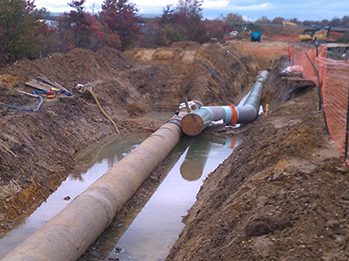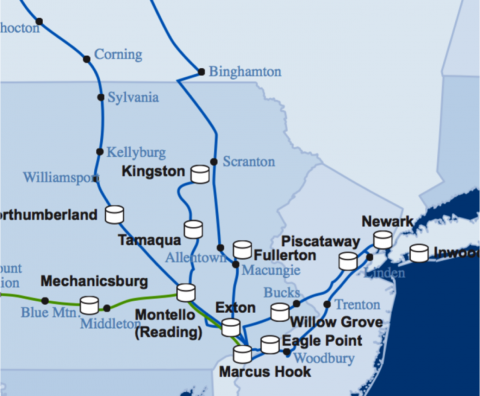Navigating the Lifeline: Colonial Pipeline’s Impact on New Jersey
Related Articles: Navigating the Lifeline: Colonial Pipeline’s Impact on New Jersey
Introduction
With enthusiasm, let’s navigate through the intriguing topic related to Navigating the Lifeline: Colonial Pipeline’s Impact on New Jersey. Let’s weave interesting information and offer fresh perspectives to the readers.
Table of Content
Navigating the Lifeline: Colonial Pipeline’s Impact on New Jersey

The Colonial Pipeline, a vital artery of the American energy infrastructure, plays a crucial role in supplying gasoline, diesel fuel, and jet fuel to the Eastern United States. While its primary route traverses the Southeast, a significant branch extends into New Jersey, impacting the state’s economy, energy security, and daily life. Understanding the pipeline’s trajectory and its connection to New Jersey is paramount for comprehending its significance within the state’s energy landscape.
Colonial Pipeline’s Reach in New Jersey
The Colonial Pipeline’s presence in New Jersey is a testament to its strategic importance. The pipeline enters the state in the southwestern region, near the Delaware River, and stretches northward through a series of counties, including Salem, Gloucester, Camden, Burlington, and Mercer. This network of pipelines terminates at various delivery points, serving major refineries, terminals, and distribution hubs across the state.
The Lifeline of Fuel Distribution
The Colonial Pipeline’s role in New Jersey is multifaceted, serving as a critical link in the chain of fuel distribution. The pipeline’s capacity to transport large volumes of refined petroleum products effectively ensures a consistent supply of gasoline, diesel fuel, and jet fuel to various sectors within the state. This reliable flow of energy resources is essential for maintaining the smooth functioning of transportation, industrial operations, and everyday life in New Jersey.
Economic and Energy Security Implications
The Colonial Pipeline’s presence in New Jersey carries significant economic and energy security implications. Its contribution to the state’s economy is undeniable, as it facilitates the efficient transport of fuels, supporting industries and businesses that rely on these resources. Furthermore, the pipeline’s existence strengthens New Jersey’s energy security by providing a reliable source of fuel supply, minimizing the risk of disruptions and ensuring the state’s resilience in the face of potential energy shortages.
Navigating the Pipeline’s Path: A Detailed Look
To gain a deeper understanding of the Colonial Pipeline’s impact on New Jersey, it is essential to examine its specific route and connections within the state. The pipeline’s journey begins in the southwest, entering New Jersey from Delaware. It then traverses the Delaware River, passing through Salem County and entering Gloucester County. Here, the pipeline branches out, with one leg continuing northward through Camden County, while another leg diverges westward towards Burlington County.
The Camden County leg of the pipeline continues its journey through the heart of the state, reaching Mercer County, where it terminates at various delivery points. These delivery points serve as critical hubs, distributing fuel to refineries, terminals, and distribution networks across the state. The Burlington County leg of the pipeline extends westward, connecting to a network of pipelines and terminals, ensuring a steady flow of fuel to various points in the state.
Environmental Considerations and Public Safety
The Colonial Pipeline’s presence in New Jersey raises important environmental and public safety considerations. As with any large-scale infrastructure project, there are potential risks associated with pipeline operations. These risks include potential leaks, spills, and accidents, which could have significant environmental and public health consequences.
To mitigate these risks, stringent safety protocols and regulatory oversight are in place. These measures aim to ensure the safe and responsible operation of the pipeline, minimizing the potential for incidents and protecting the environment and public safety. Regular inspections, maintenance, and monitoring are essential components of this safety framework.
Frequently Asked Questions
Q: What is the purpose of the Colonial Pipeline in New Jersey?
A: The Colonial Pipeline serves as a vital artery for transporting refined petroleum products, including gasoline, diesel fuel, and jet fuel, to various destinations in New Jersey. This ensures a consistent supply of fuel for transportation, industry, and everyday life in the state.
Q: How does the Colonial Pipeline contribute to the economy of New Jersey?
A: The pipeline’s efficient transportation of fuels supports industries and businesses that rely on these resources, contributing to the state’s economic growth and job creation.
Q: What are the potential environmental impacts of the Colonial Pipeline in New Jersey?
A: Potential environmental impacts include leaks, spills, and accidents, which could have significant consequences for the environment. However, stringent safety measures and regulatory oversight are in place to minimize these risks.
Q: What measures are in place to ensure the safety of the Colonial Pipeline in New Jersey?
A: Regular inspections, maintenance, and monitoring are essential components of the safety framework for the pipeline, ensuring its safe and responsible operation.
Tips for Staying Informed about the Colonial Pipeline
1. Consult Official Sources: Stay informed about the Colonial Pipeline’s operations by referring to official sources, such as the company’s website and regulatory agencies.
2. Monitor News Reports: Keep abreast of any developments or incidents related to the pipeline by monitoring news reports and updates from reliable sources.
3. Participate in Public Forums: Engage in public forums and discussions about the pipeline, providing input and staying informed about community concerns and initiatives.
Conclusion
The Colonial Pipeline’s presence in New Jersey is a testament to its crucial role in the state’s energy landscape. Its efficient transportation of fuel ensures a reliable supply for transportation, industries, and everyday life. While environmental and safety considerations are paramount, stringent measures are in place to mitigate risks and ensure responsible operation. By staying informed and engaging in constructive dialogue, residents can contribute to the responsible management of this vital infrastructure asset.

![]()






Closure
Thus, we hope this article has provided valuable insights into Navigating the Lifeline: Colonial Pipeline’s Impact on New Jersey. We thank you for taking the time to read this article. See you in our next article!